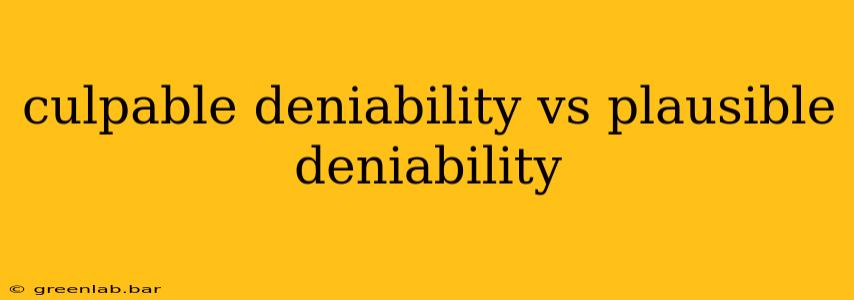The terms "culpable deniability" and "plausible deniability" are often used interchangeably, leading to confusion. However, there's a crucial distinction between the two concepts, particularly in legal and ethical contexts. While both involve denying knowledge or responsibility, the nature of that denial is what sets them apart. This post will delve into the core differences, providing clear examples to illustrate the nuances.
What is Plausible Deniability?
Plausible deniability refers to a situation where someone can deny involvement in an action or event because there's enough uncertainty or lack of evidence to make their denial believable. It's a strategy employed to protect oneself from accusations or repercussions. The key is that the denial could be true, even if it's not.
Key Characteristics of Plausible Deniability:
- Lack of direct evidence: No clear, irrefutable proof links the individual to the action.
- Reasonable doubt: There's enough ambiguity or alternative explanations to create reasonable doubt about the individual's involvement.
- Preemptive measures (sometimes): Individuals may take steps to create the appearance of distance from potentially problematic activities, even if they're secretly involved. This could involve using intermediaries or obscuring communication trails.
- Not inherently illegal: While often used in unethical situations, plausible deniability itself is not illegal. It becomes problematic when used to shield illegal or immoral actions.
Example: A company executive might claim ignorance about an illegal activity within a department, citing a lack of direct reporting or communication on that specific issue. While this might be a lie, the lack of concrete evidence makes the denial plausible.
What is Culpable Deniability?
Culpable deniability, on the other hand, implies a conscious effort to avoid knowledge or responsibility. It's not just a lack of evidence; it's a deliberate attempt to remain uninformed or appear uninvolved while still benefiting from or implicitly supporting the actions in question. The denial is, therefore, inherently false.
Key Characteristics of Culpable Deniability:
- Deliberate ignorance: The individual actively chooses to remain ignorant of potentially problematic activities.
- Willful blindness: The individual suspects something is amiss but chooses to ignore it.
- Indirect involvement: The individual may not directly participate but benefits from or enables the actions through inaction or indirect support.
- Ethical and/or legal implications: Culpable deniability often carries significant ethical and legal consequences because it demonstrates a lack of accountability.
Example: A supervisor repeatedly ignores reports of harassment within their team, choosing to believe nothing is wrong despite clear evidence to the contrary. Their denial is culpable because it's a deliberate attempt to avoid responsibility.
The Crucial Difference: Intent and Knowledge
The core distinction lies in intent and knowledge. Plausible deniability relies on the absence of clear evidence, while culpable deniability involves the deliberate creation or exploitation of that absence. In plausible deniability, the denial could be true; in culpable deniability, it's demonstrably false. The difference hinges on whether the lack of knowledge was truly unintentional or deliberately cultivated.
Legal and Ethical Ramifications
Understanding the difference between these two concepts is critical in legal and ethical contexts. Culpable deniability can lead to severe penalties, including legal charges and reputational damage. While plausible deniability may not always be illegal, it often raises serious ethical questions about responsibility and accountability.
Conclusion
Culpable deniability and plausible deniability are subtly different yet significantly impactful concepts. Recognizing the distinction between deliberate ignorance and genuine lack of information is crucial for evaluating responsibility, assigning blame, and ensuring accountability in various situations. The presence of willful blindness or deliberate actions to avoid knowledge are what transforms a seemingly plausible denial into a culpable one, carrying far more severe implications.

